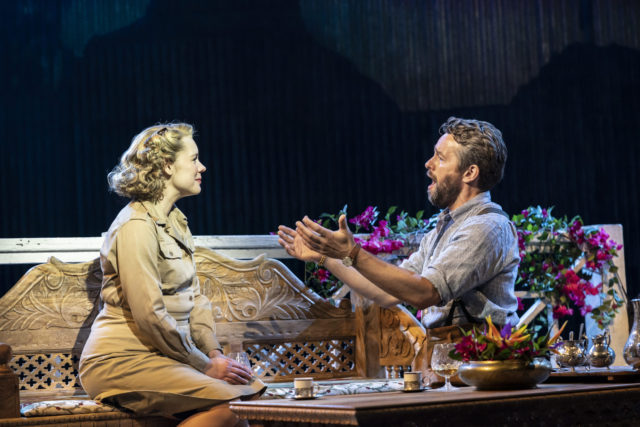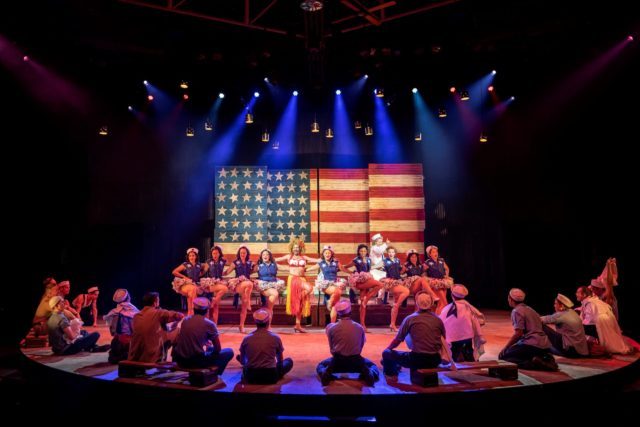
Nellie Forbush (Gina Beck) and Emile de Becque (Julian Ovenden) have a complicated relationship in South Pacific (photo by Johan Persson)
SOUTH PACIFIC
Chichester Festival THeatre
Through September 3, £20 – £30
www.cft.org.uk
Beloved Broadway musicals, just like other art forms, are undergoing a reckoning when it comes to such issues as racism, slavery, gender, class, sexuality, cultural appropriation, and colonialism. In recent years, revivals of Rodgers and Hammerstein’s Carousel, The King and I, and Oklahoma! as well as Lerner and Loewe’s My Fair Lady (a show Rodgers and Hammerstein attempted) have all been seen through a new lens, with tweaks that have annoyed purists but delighted those seeking equality and consciousness in all walks of life.
Traditionalists and progressives alike should be in agreement on Chichester Festival Theatre’s rousing revival of South Pacific, being performed in London through September 5 but also available to stream, recorded live onstage with an audience, on select days through September 3. Featuring music by Richard Rodgers, lyrics by Oscar Hammerstein II, and book by Hammerstein and Joshua Logan adapted from James A. Michener’s Pulitzer Prize–winning Tales of the South Pacific, the show takes place in 1943 on an archipelago in the South Pacific, where US troops have not been called on to fight yet. As they wait to enter the war and do their duty, they mix with the local people, which doesn’t necessarily please the higher-ups.
Ensign Nellie Forbush (Gina Beck), the head nurse, falls for French ex-pat Emile de Becque (Julian Ovenden). Bloody Mary (Joanna Ampil) will sell just about anything to GIs, including shrunken human heads, in order to make a better life for her beautiful young daughter, Liat (Sera Maehara), whom steadfast Lt. Joseph Cable (Rob Houchen) takes a shine to. Fast-talking Seabee Luther Billis (Keir Charles) provides comic relief while also initiating several key plot twists. The central love story between Nellie and Emile is at the heart of the show, but it’s not a standard romance. Rather, it is one that challenges the viewer, as Nellie reveals her surprising underlying racism, while Emile, who owns a plantation, is haunted by having killed a man back home. They are not your typical hero couple.
CFT artistic director Daniel Evans (This Is My Family, Quiz) directs a cast of more than thirty on the circular stage, which occasionally rotates slowly. The production looks and sounds phenomenal, with sets and costumes by Peter McKintosh, who nails scene after scene, from Billis’s laundry business to a USO show (with drag) to the nurses at a beach. Howard Harrison’s lighting is superb, particularly during Liat’s expressive and poignant solo dance. (Ann Yee is the choreographer and movement director, with sound by Paul Groothius.) New orchestrations by David Cullen, with musical supervision by Nigel Lilley and musical direction by Cat Beveridge, inject new life into old favorites, including “Some Enchanted Evening,” “I’m Gonna Wash That Man Right Outa My Hair,” “Honey Bun,” “There Is Nothin’ Like a Dame,” and “Bali Ha’i.” There are a lot of reprises, which get, well, too repetitive for me, but why limit a good song?

CFT revival of Sout Pacific is chock-full of wonderful set pieces (photo by Johan Persson)
Beck, who is pregnant (she shares the role with Alex Young live at CFT but is on the stream), is lovely as Nellie; we root for her even when she makes the racist statement that shocks us, while Ovenden is beguiling as Emile, his booming, operatic voice dominating the stage. The characters were originated on Broadway by Mary Martin and Ezio Pinza and have also been portrayed onstage by Florence Henderson and Giorgio Tozzi in 1967 and Kelli O’Hara and Paulo Szot in 2008 and on the big screen by Mitzi Gaynor and Rossano Brazzi in 1958 and Glenn Close and Rade Sherbedgia in 2001. Without their chemistry, the show would be a series of set pieces and subplots, some better than others. The romance between Cable and Liat has always been troublesome, and Billis’s overenthusiasm can be grating.
But Rodgers and Hammerstein knew what they were doing from the very start, not afraid to take on difficult issues. “You’ve got to be taught / Before it’s too late / Before you are six / Or seven / Or eight / To hate all the people / Your relatives hate,” Cable sings in a controversial song that was occasionally removed from some presentations. Emile responds, “This is just the kind of ugliness I was running away from / It has followed me all this way / All these years / And now it has found me.”
In “A Cockeyed Optimist,” Nellie sings, “I hear the human race is falling on its face / And hasn’t very far to go.” That might be true, especially these days, but with productions such as CFT’s South Pacific, there’s reason to be hopeful and optimistic about the future.